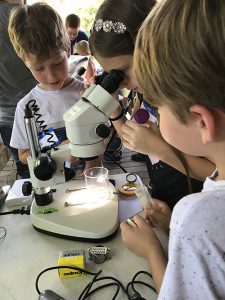 Scientists from the UF/IFAS Florida Medical Entomology Lab (FMEL) and Indian River Research and Education Center (IRREC) invited children ages six through 12 to join them for a morning of collecting, observing, discussing and releasing insects at Heathcote Botanical Gardens on July 28.
Scientists from the UF/IFAS Florida Medical Entomology Lab (FMEL) and Indian River Research and Education Center (IRREC) invited children ages six through 12 to join them for a morning of collecting, observing, discussing and releasing insects at Heathcote Botanical Gardens on July 28.
“A Celebration of Insects” idea came from UF/IFAS professor emeritus Phil Lounibos and is supported by FMEL and IRREC graduate students pursuing master’s and Ph.D. degrees in entomology and nematology within the UF/IFAS College of Agricultural and Life Sciences (CALS). This was the inaugural year of the event.
“Our main goal is to showcase the diversity of insects that live around us, and to empower children to engage with that diversity independently after their participation in the event,” said Casey Parker, a Ph.D. student at FMEL also earning a master’s degree in public health from UF. “We want to share how fun science can be and that this event is a time for discovery!”
 The FMEL and IRREC graduate students come from various locations in the U.S. and around the world including Tennessee, Pennsylvania, Alabama, Florida, Brazil, Taiwan, Costa Rica and France. Many of the students are conducting research on biological control of pests, which is the utilization of insects to control other, harmful insects. Other students are researching diseases that are spread by insects to people and animals.
The FMEL and IRREC graduate students come from various locations in the U.S. and around the world including Tennessee, Pennsylvania, Alabama, Florida, Brazil, Taiwan, Costa Rica and France. Many of the students are conducting research on biological control of pests, which is the utilization of insects to control other, harmful insects. Other students are researching diseases that are spread by insects to people and animals.
All of the students enjoy sharing their enthusiasm for insect biology through public outreach efforts. The students make appearances at several community events throughout the year, such as the Indian River Lagoon Science Fest, sharing their research and the broad applications of an entomologist’s work.
“Sharing my fascination and awe of the natural world with people is what I love most about being a biologist,” said Richard West, a master’s student at FMEL. “I have always loved the saying, ‘People do not care how much you know until they know how much you care.’ Extension is a way to show how much we care for others and, in turn, teach them what we have learned ourselves about the world around us.”
 0
0
